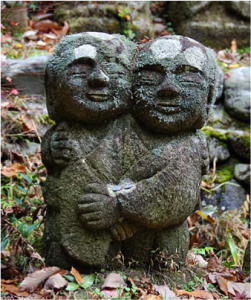 This month our Moving into Meditation class continues study of the Yoga Ethic of Tapas. The principle of Tapas, self discipline, is part of Yoga’s Eightfold Path of living a conscious life. The powers of “I Will” and “I Won’t” correspond to Patanjali’s Yamas and Niyamas.
This month our Moving into Meditation class continues study of the Yoga Ethic of Tapas. The principle of Tapas, self discipline, is part of Yoga’s Eightfold Path of living a conscious life. The powers of “I Will” and “I Won’t” correspond to Patanjali’s Yamas and Niyamas.
“I Will” roughly corresponds to the five individual guidelines or observances, in Sanskrit called the Niyamas:
Saucha – purity, care for one’s physical, mental, emotional and spiritual well being
Santosha – contentment, willingness to accept what is
Tapas – self-discipline, inner-fire, ardor
Svadhyaya – self-reflection, study of wisdom teachings
Isvara-Pranidhana – surrender to that which supports our lives, devotion
 “I won’t” corresponds to the five social guidelines or restraints called the Yamas:
“I won’t” corresponds to the five social guidelines or restraints called the Yamas:
Ahimsa – nonviolence, compassion for self and others
Satya – truth in thoughts, words and deeds
Asteya – not taking that which has not been freely given, generosity
Brahmacharya – moderation, conservation of energy
Aparigraha – non-covetousness, generosity in spirit and action
Guided Relaxation
In her poem, Messenger, Mary Oliver says:
 My work is loving the world.
My work is loving the world.
Here the sunflowers, there the hummingbird —
equal seekers of sweetness.
Here the quickening yeast; there the blue plums.
Here the clam deep in the speckled sand.
 Are my boots old? Is my coat torn?
Are my boots old? Is my coat torn?
Am I no longer young, and still half-perfect? Let me
keep my mind on what matters,
which is my work,
which is mostly standing still and learning to be
astonished.
The phoebe, the delphinium.
The sheep in the pasture, and the pasture.
Which is mostly rejoicing, since all the ingredients are here,
which is gratitude, to be given a mind and a heart
and these body-clothes,
a mouth with which to give shouts of joy
to the moth and the wren, to the sleepy dug-up clam,
telling them all, over and over, how it is
that we live forever.
Why are we given “a mind and a heart and these body-clothes”? What “shouts of joy” do we give to world? How is it that we will live forever? Can we keep our minds on what matters? How do we perform our work that is loving the world?
What do we want with the energy of love? What inner fire fuels our caring – our willing? Are you clear about what matters most to you? What is at the heart of your “Want”? The heart of ”I Want” is where we find the motivational power – we need to either do the “harder thing” or to refrain from doing the “impulsive thing.” What want is worthy of your action – your will – and your restraint – your won’t? Take a few moments to reflect on what is true for you.
Our yoga practice can be a training ground for making lasting change when we can meet inertia and resistance with compassion and mindfulness, patience and wisdom. Self-knowledge, self-awareness is the foundation upon which we can build our will. Our mindful awareness enables us develop the willingness to act in service of what we value. We embody our caring. Mindfulness is so powerful. What does it mean to be mindful of the breath? Something very simple: to keep the breath in mind. Simple yet not easy. In movement practice we keep our bodies, our breath and our movements in mind. When our attention strays we bring it back again. In this way we build resilience: our capacity to attend.
In, The Science of Compassion, Dr. Kelly McGonigal writes, “If you think that the key to greater willpower is being harder on yourself, you are not alone. But you are wrong. Study after study shows that self-criticism is consistently associated with less motivation and worse self-control.” Compassion does not lack accountability; it is an essential ingredient for change.
In her book, The Willpower Instinct, she writes:
“. . . that everyone struggles in some way with temptation, addiction, distraction and procrastination. These are not individual weaknesses that reveal personal inadequacies. They are universal experiences . . . part of the human condition. See the common humanity of willpower struggles. Don’t concern yourself with being “bad” or “good” at meditation. Pay attention to not just how well you focus during meditation but also how well you focus and make choices during the rest of your day.”
As Mary Oliver writes – our work is loving the world. The world includes us.

